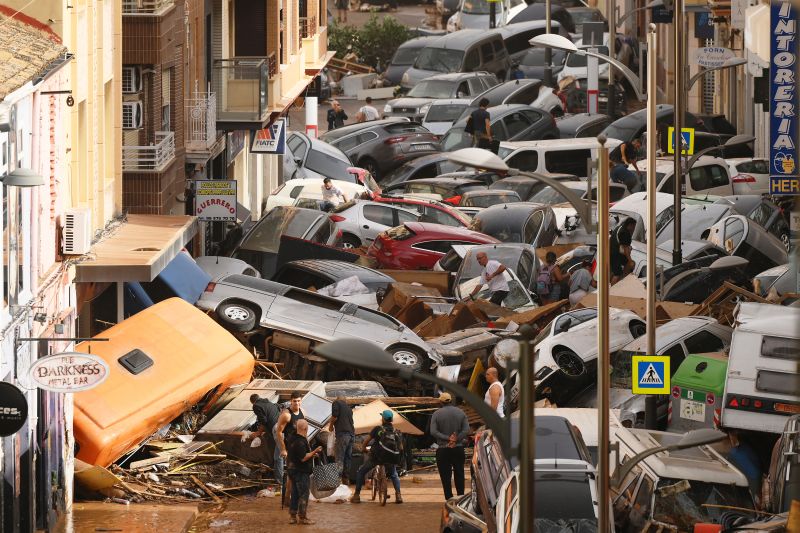**The Catastrophic Floods in Spain: An Overview**
In Spain, a country known for its splendorous landscapes rich with art and culture, an atmospheric disturbance caused the worst floods in decades plunging regions into a state of emergency. The weather department has described this catastrophic incident as a gota fria (cold drop), where cooler air from the north collides with warm Mediterranean air, leading to intense precipitation.
In a nation where the sun shines frequently, this unexpected calamity has left its citizens disoriented and grappling with loss, damage, and the undeniable realities of climate change.
**Geographical Impact and Aftermath**
Regions like Murcia, Valencia, and Alicante, known for their beautiful orchards, fields, and coastal ennui, were the hardest hit, experiencing their highest rainfall in over a century. Streets turned into muddy, impassable rivers, cars were uprooted, homes, farms, and other infrastructure were destroyed, plunging the entire nation into a state of turmoil.
This extreme weather event saw torrents of water sweeping away not just vehicles, but also bridges, roads, and anything that stood its way, even resulting in fatalities. The frequency and magnitude of these floods over the remainder of the decade escalated concerns about climate change and its impact on weather patterns in Spain.
**Response and Recovery Efforts**
In the face of adversity, Spain’s response to the crisis was commendable with immediate mobilization of resources. The Spanish military’s emergency unit was quickly deployed for operations involving rescue, evacuation, and restoration. Citizens across the country united as a community to provide help in forms such as shelter, food, water, and clothing to the affected people. The Spanish government also declared a state of emergency in several areas, enabling faster access to relief funds and reconstruction efforts.
The recovery process, was in fact, as tumultuous and challenging as the calamitous event. However, relentless hard work and determination characterized Spain’s model of resilience in the face of adversity. Their systematic approach towards relief, rehabilitation, and rebuilding makes it a case study worth learning from.
**The bigger issue: Climate Change**
Spain’s deadliest floods highlight the pressing concern of climate change and its manifestations. Scientists warn that episodes of such severe weather are expected to increase in frequency due to global warming. Higher atmospheric temperatures cause more evaporation, enabling the air to hold more water and leading to increased precipitation.
Spain, a country that usually basks in the warmth of the sun, is now experiencing weather extremes, indicating the urgent need for effective climate action. The floods have also brought into focus the necessity for improved urban planning to better manage catastrophic events feeding into the larger conversation on climate change policy and urban resilience.
**Spain’s Lessons on Resilience and Climate Action**
While Spain is recovering from its deadliest floods, what it has done in response, and the measures it has taken thereafter ought to be relooked at and commended. Their admirable resilience in the face of catastrophe demonstrates a preparedness to cope with changing weather patterns and the dedication required to rehabilitate and restore affected areas.
The floods shed light on the urgency of climate action and the importance of focusing on climate change from a policy perspective. Resistance and adaptation to climate change, learning to survive and thrive in spite of it, while also taking substantial strides to mitigate it, should be the crux of not just Spain’s, but our global conversation on climate change. The Spanish people have shown that they can rise above a disaster, and their experiences serve as a stark reminder to the rest of the world about the realities we face. The sorrow of Spain’s deadliest floods is profound; but it is also a hard-hitting call to a collective, worldwide climate action.




